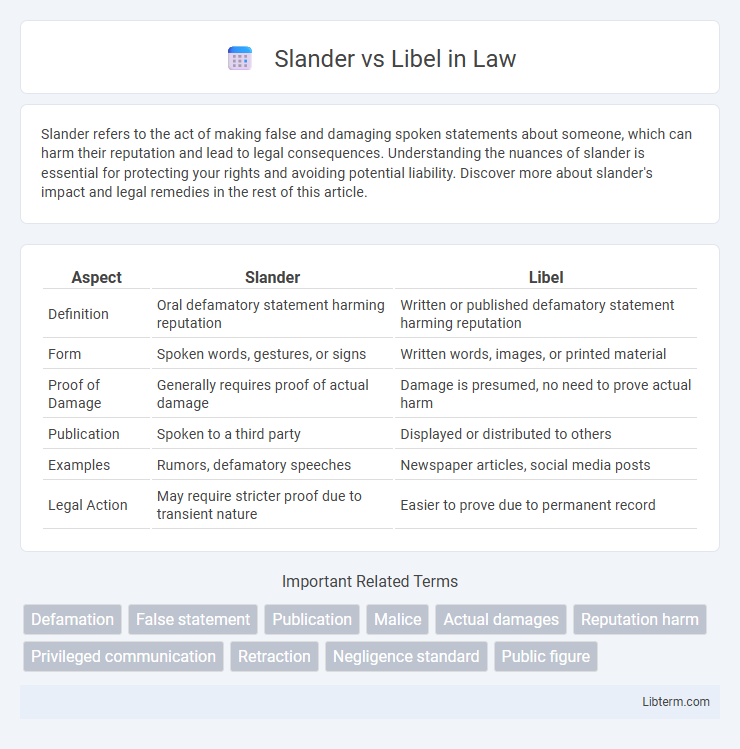Slander refers to the act of making false and damaging spoken statements about someone, which can harm their reputation and lead to legal consequences. Understanding the nuances of slander is essential for protecting your rights and avoiding potential liability. Discover more about slander's impact and legal remedies in the rest of this article.
Table of Comparison
| Aspect | Slander | Libel |
|---|---|---|
| Definition | Oral defamatory statement harming reputation | Written or published defamatory statement harming reputation |
| Form | Spoken words, gestures, or signs | Written words, images, or printed material |
| Proof of Damage | Generally requires proof of actual damage | Damage is presumed, no need to prove actual harm |
| Publication | Spoken to a third party | Displayed or distributed to others |
| Examples | Rumors, defamatory speeches | Newspaper articles, social media posts |
| Legal Action | May require stricter proof due to transient nature | Easier to prove due to permanent record |
Understanding Defamation: An Overview
Defamation encompasses false statements that harm a person's reputation, split into slander and libel based on the form of communication. Slander refers to transient oral statements, while libel involves permanent written or published material, both requiring proof of falsehood and damage. Understanding the legal distinctions and evidentiary standards is essential for evaluating defamation claims effectively.
What is Slander?
Slander is a form of defamation that involves making false, damaging statements about someone orally rather than in written or published form. It typically occurs through spoken words, gestures, or other transient forms of communication that harm a person's reputation. Unlike libel, which is written defamation, slander requires the claimant to prove actual damage or harm resulting from the statements made.
What is Libel?
Libel is a form of defamation that involves making false and damaging statements about someone in a written or published format, such as newspapers, books, websites, or social media posts. Unlike slander, which is spoken, libel is recorded and can cause lasting harm to a person's reputation, leading to legal claims for damages. Proving libel typically requires demonstrating that the statement is false, damaging, and made without adequate research into its truthfulness.
Key Differences Between Slander and Libel
Slander involves making false spoken statements that harm a person's reputation, while libel refers to false written or published defamatory remarks. Key differences include the medium of expression--slander is transient and oral, whereas libel is fixed in a tangible form such as print or digital content. Legal implications also vary; libel generally results in more severe damages due to its permanence and broader reach.
Legal Elements Required in Slander Cases
Slander cases require proving a defamatory statement was made orally to a third party, causing reputational harm to the plaintiff. The plaintiff must show the statement is false, unprivileged, and made with at least negligence regarding its truth. Sound evidence of actual damages or clear proof of harm is critical, as slander often involves transient spoken words lacking a permanent record.
Legal Elements Required in Libel Cases
Libel cases require proof of a false and defamatory statement published in a fixed medium, such as writing, broadcast, or digital formats, which directly injures the plaintiff's reputation. The plaintiff must demonstrate that the statement was made with at least negligence regarding its falsity, or with actual malice if the plaintiff is a public figure or official. Damages, which can be presumed or actual depending on jurisdiction, are essential elements for establishing liability in libel claims.
Real-World Examples of Slander and Libel
Slander and libel are forms of defamation distinguished by their modes of communication: slander is spoken, while libel is written or published. Real-world examples of slander include false verbal accusations made during a public speech or broadcast, such as a celebrity being falsely accused of criminal behavior on live radio. Libel cases often involve defamatory statements in newspapers, magazines, or online publications where false claims damage a person's reputation, exemplified by a journalist publishing unfounded allegations about a public figure's professional misconduct.
Potential Defenses Against Slander and Libel Claims
Potential defenses against slander and libel claims include truth, which serves as an absolute defense by proving the statement's accuracy; privilege, encompassing absolute privilege in judicial or legislative proceedings and qualified privilege in contexts like fair reporting; and opinion, where statements framed as subjective opinions rather than factual assertions are protected. Consent from the plaintiff to publish the statement also negates liability, as does the lack of actual malice in defamation cases involving public figures, requiring claimants to prove the defendant knowingly made false statements or acted with reckless disregard for the truth. These defenses are crucial in balancing freedom of speech with protection against reputational harm in defamation law.
Consequences and Penalties of Defamation
Slander and libel, both forms of defamation, carry significant legal consequences including monetary damages and injunctions to prevent further harm to reputation. In libel cases, damages often tend to be higher due to the permanent, published nature of the false statements, while slander may require proof of specific harm unless it involves slander per se, which is presumed damaging. Criminal penalties can also apply in some jurisdictions, leading to fines or imprisonment, highlighting the severity of defamatory communication on personal and professional reputations.
How to Protect Yourself from Slander and Libel
To protect yourself from slander and libel, document any defamatory statements with dates, sources, and evidence such as recordings or written materials. Consult a qualified defamation attorney to understand your legal rights and potential remedies like cease-and-desist letters or lawsuits. Practice cautious communication online and offline by avoiding making unverified claims that could harm others' reputations.
Slander Infographic

 libterm.com
libterm.com